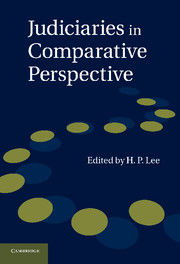Book contents
- Frontmatter
- Contents
- Contributors
- Foreword
- Preface
- Table of cases
- Table of statutes
- Part I
- Part II
- 2 Appointment, discipline and removal of judges in Australia
- 3 Appointment, discipline and removal of judges in Canada
- 4 Appointment, discipline and removal of judges in New Zealand
- 5 Appointment, discipline and removal of judges in South Africa
- 6 Appointment, discipline and removal of judges
- 7 Judicial selection, removal and discipline in the United States
- Part III
- Part IV
- Part V
- Part VI
- Index
- References
6 - Appointment, discipline and removal of judges
fundamental reforms in the United Kingdom
from Part II
Published online by Cambridge University Press: 07 September 2011
- Frontmatter
- Contents
- Contributors
- Foreword
- Preface
- Table of cases
- Table of statutes
- Part I
- Part II
- 2 Appointment, discipline and removal of judges in Australia
- 3 Appointment, discipline and removal of judges in Canada
- 4 Appointment, discipline and removal of judges in New Zealand
- 5 Appointment, discipline and removal of judges in South Africa
- 6 Appointment, discipline and removal of judges
- 7 Judicial selection, removal and discipline in the United States
- Part III
- Part IV
- Part V
- Part VI
- Index
- References
Summary
When the time comes to identify the most significant legacy of the period of the Labour Government from 1997 to 2010, it is likely that constitutional reform will be a strong contender. Under a broad ‘modernisation’ manifesto, a raft of changes were introduced which have reshaped the constitutional map of the United Kingdom. Devolution of power to Scotland, Northern Ireland and Wales, the reform of the House of Lords and the incorporation of the European Convention on Human Rights into domestic law are some of the most familiar of these reforms. Equally important, though less widely known, are the profound changes affecting the judicial branch of government. In June 2003, the government announced, unexpectedly, that the office of Lord Chancellor was to be abolished, a new Supreme Court was to be set up and the judicial appointments process radically reformed. At the time, some commentators claimed that these proposals were an attempt on the part of the Government to take control of an increasingly activist judiciary. As the details emerged, however, it became clear that such fears were unfounded. Indeed, one of the most paradoxical and striking features of the reforms was that they effected a fundamental shift of power away from the executive.
- Type
- Chapter
- Information
- Judiciaries in Comparative Perspective , pp. 117 - 133Publisher: Cambridge University PressPrint publication year: 2011
References
- 2
- Cited by



